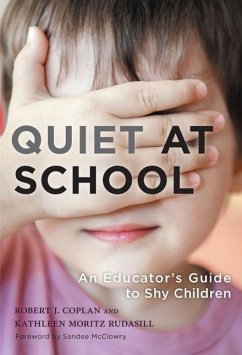Compared to their more sociable counterparts, shy children are at greater risk for a variety of difficulties in elementary school, including internalizing problems, difficulties with peer relationships, and poorer academic performance. Written by a developmental and an educational psychologist with decades of experience between them, this book demystifies the latest research on shyness. It offers a comprehensive and accessible guide to everything teachers should know about shy children. Topics covered include how shyness develops in childhood, the unique challenges faced by shy children at school, and general strategies and specific techniques for improving shy childrens social, emotional, and academic functioning at school. Despite an increase in research on shyness, shy children are still not well understood by teachers and other school personnel. Quiet at School offers research-based practices for creating safe and inclusive learning environments that will help shy students thrive.
Hinweis: Dieser Artikel kann nur an eine deutsche Lieferadresse ausgeliefert werden.
Hinweis: Dieser Artikel kann nur an eine deutsche Lieferadresse ausgeliefert werden.








